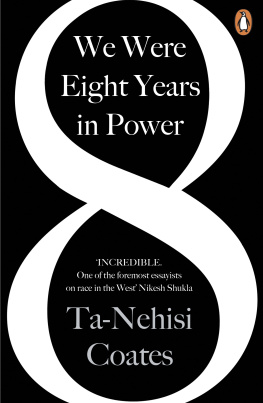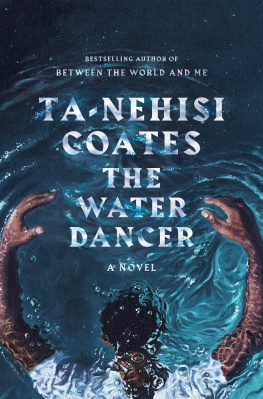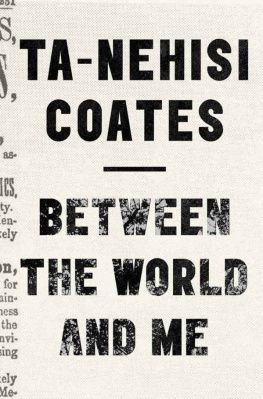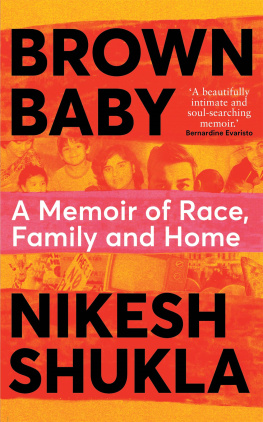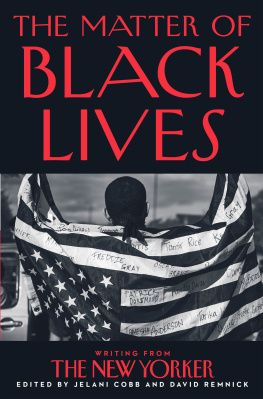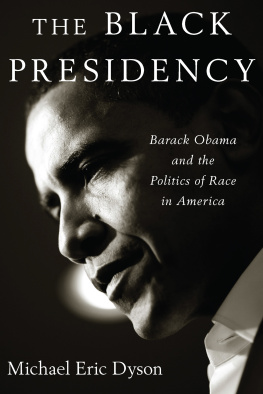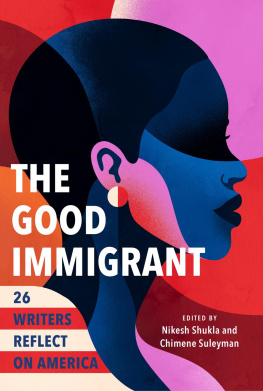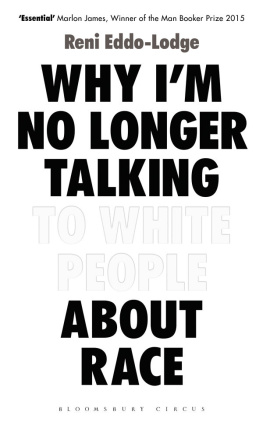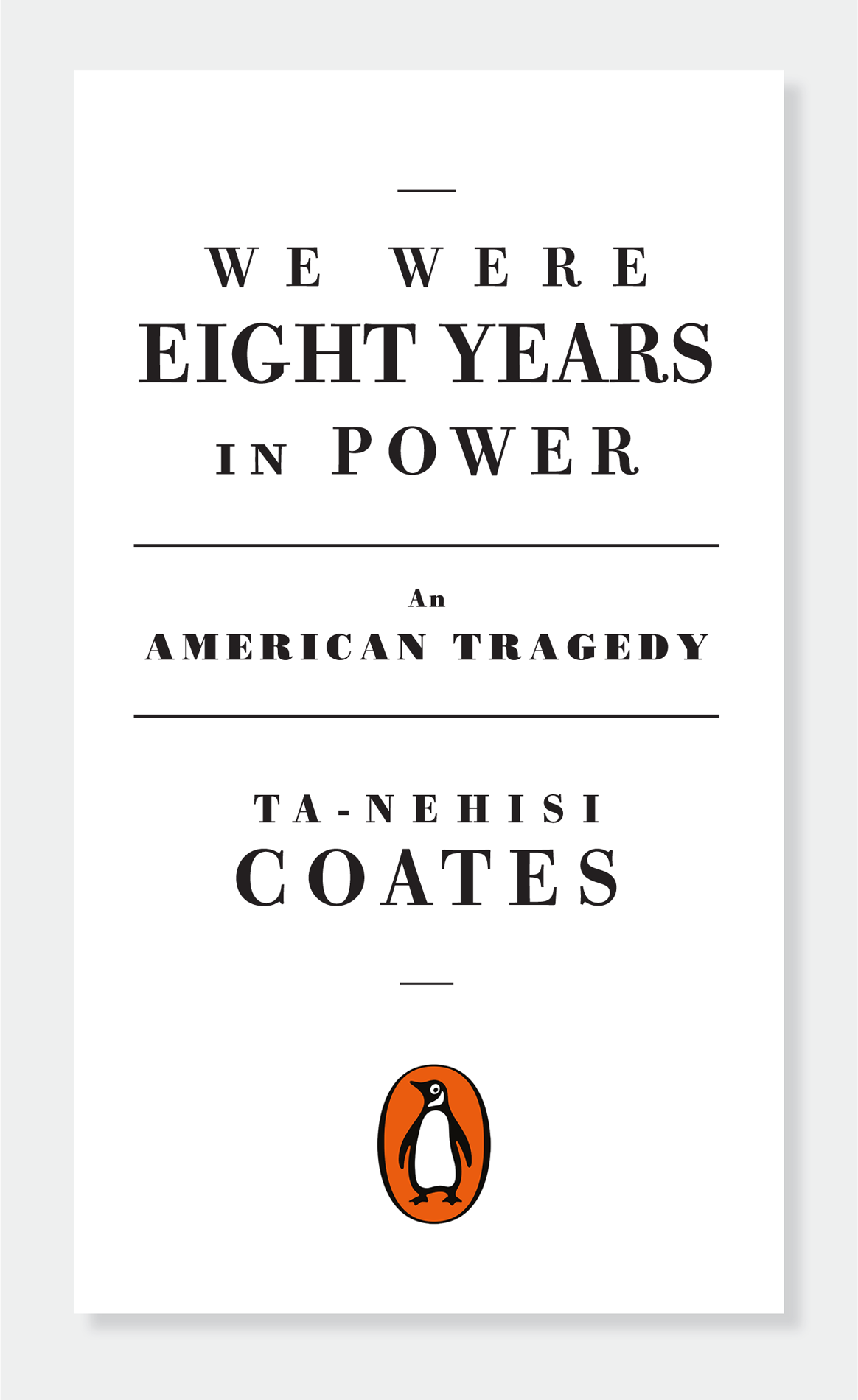BY TA-NEHISI COATES
We Were Eight Years in Power
Between the World and Me
The Beautiful Struggle
HAMISH HAMILTON
UK | USA | Canada | Ireland | Australia
India | New Zealand | South Africa
Hamish Hamilton is part of the Penguin Random House group of companies whose addresses can be found at global.penguinrandomhouse.com.
First published in the United States of America by One World, an imprint of Random House, a division of Penguin Random House, LLC 2017
First published in Great Britain by Hamish Hamilton 2017
Copyright BCP Literary, Inc., 2017
Grateful acknowledgement is made to the Atlantic for permission to reprint the following articles by Ta-Nehisi Coates, originally published in the Atlantic: , copyright Ta-Nehisi Coates, 2017. Reprinted by permission of the Atlantic
The moral right of the author has been asserted
ISBN: 978-0-241-98250-1
To Kenyatta, Tom, Nikola and Amelie,
who went with me into the deep,
and saw me back to shore
We dont just shine, we illuminate the whole show.
JAY-Z
Introduction
REGARDING GOOD NEGRO GOVERNMENT
In 1895, two decades after his state moved from the egalitarian innovations of Reconstruction to an oppressive Redemption, South Carolina congressman Thomas Miller appealed to the states constitutional convention:
We were eight years in power. We had built schoolhouses, established charitable institutions, built and maintained the penitentiary system, provided for the education of the deaf and dumb, rebuilt the ferries. In short, we had reconstructed the State and placed it upon the road to prosperity.
By the 1890s, Reconstruction had been painted as a fundamentally corrupt era of Negro Rule. It was said that South Carolina stood under threat of being Africanized and dragged into barbarism and iniquity. Miller hoped that by highlighting black achievement in governance and marshaling a credible defense of black morality, he might convince the doubtlessly fair-minded people of South Carolina to preserve the citizenship rights of African Americans. His plea went unheeded. The 1895 constitution added both literacy tests and property requirements as qualifications for enfranchisement. When those measures proved insufficient to enforcing white supremacy, black citizens were shot, tortured, beaten, and maimed.
Assessing Millers rebuttal and the 1895 convention, W.E.B. Du Bois made a sobering observation. From Du Boiss perspective, the 1895 constitutional convention was not an exercise in moral reform, or an effort to purge the state of corruption. This was simply cover for the conventions true aimthe restoration of a despotic white supremacy. The problem was not that South Carolinas Reconstruction-era government had been consumed by unprecedented graft. Indeed, it was the exact opposite. The very successes Miller highlighted, the actual record of Reconstruction in South Carolina, undermined white supremacy. To redeem white supremacy, that record was twisted, mocked, and caricatured into something that better resembled the prejudices of white South Carolina. If there was one thing that South Carolina feared more than bad Negro government, wrote Du Bois, it was good Negro government.
The fear had precedent. Toward the end of the Civil War, having witnessed the effectiveness of the Unions colored troops, a flailing Confederacy began considering an attempt to recruit blacks into its army. But in the nineteenth century, the idea of the soldier was heavily entwined with the notion of masculinity and citizenship. How could an army constituted to defend slavery, with all of its assumptions about black inferiority, turn around and declare that blacks were worthy of being invited into Confederate ranks? As it happened, they could not. The day you make a soldier of them is the beginning of the end of our revolution, observed Georgia politician Howell Cobb. And if slaves seem good soldiers, then our whole theory of slavery is wrong. There could be no win for white supremacy here. If blacks proved to be the cowards that the whole theory of slavery painted them as, the battle would literally be lost. But much worse, should they fight effectivelyand prove themselves capable of good Negro governmentthen the larger war could never be won.
The central thread of this book is eight articles written during the eight years of the first black presidencya period of Good Negro Government. Obama was elected amid widespread panic and, in his eight years, emerged as a caretaker and measured architect. He established the framework of a national healthcare system from a conservative model. He prevented an economic collapse and neglected to prosecute those largely responsible for that collapse. He ended state-sanctioned torture but continued the generational war in the Middle East. His familythe charming and beautiful wife, the lovely daughters, the dogsseemed pulled from the Brooks Brothers catalogue. He was not a revolutionary. He steered clear of major scandal, corruption, and bribery. He was deliberate to a fault, saw himself as the keeper of his countrys sacred legacy, and if he was bothered by his countrys sins, he ultimately believed it to be a force for good in the world. In short, Obama, his family, and his administration were a walking advertisement for the ease with which black people could be fully integrated into the unthreatening mainstream of American culture, politics, and myth.
And that was always the problem.
One strain of African American thought holds that it is a violent black recklessnessthe black gangster, the black rioterthat strikes the ultimate terror in white America. Perhaps it does, in the most individual sense. But in the collective sense, what this country really fears is black respectability, Good Negro Government. It applauds, even celebrates, Good Negro Government in the unthreatening abstractThe Cosby Show, for instance. But when it becomes clear that Good Negro Government might, in any way, empower actual Negroes over actual whites, then the fear sets in, the affirmative-action charges begin, and birtherism emerges. And this is because, at its core, those American myths have never been colorless. They cannot be extricated from the whole theory of slavery, which holds that an entire class of people carry peonage in their blood. That peon class provided the foundation on which all those myths and conceptions were built. And as much as we can theoretically imagine a seamless black integration into the American myth, the white part of this country remembers the myth as it was conceived.
I think the old fear of Good Negro Government has much explanatory power for what might seem a shocking turnthe election of Donald Trump. It has been said that the first black presidency was mostly symbolic, a dismissal that deeply underestimates the power of symbols. Symbols dont just represent reality but can become tools to change it. The symbolic power of Barack Obamas presidencythat whiteness was no longer strong enough to prevent peons from taking up residence in the castleassaulted the most deeply rooted notions of white supremacy and instilled fear in its adherents and beneficiaries. And it was that fear that gave the symbols Donald Trump deployedthe symbols of racismenough potency to make him president, and thus put him in position to injure the world.
There is a basic assumption in this country, one black people are not immune to, which holds that if blacks comport themselves in a way that accords with middle-class values, if they are polite, educated, and virtuous, then all the fruits of America will be open to them. In its most vulgar form, this theory of personal Good Negro Government denies the existence of racism and white supremacy as meaningful forces in American life. In its more nuanced and reputable form, the theory pitches itself as an equal complement to anti-racism. But the argument made in much of this book is that Good Negro Governmentpersonal and politicaloften augments the very white supremacy it seeks to combat. That is what happened to Thomas Miller and his colleagues in 1895. It is what happened to black people all through South Carolina during Redemption. It is what happened to black people on the South Side of Chicago during the postwar implementation of the New Deal. And it is what, I contend, is right now happening to the legacy of the countrys first black president.

